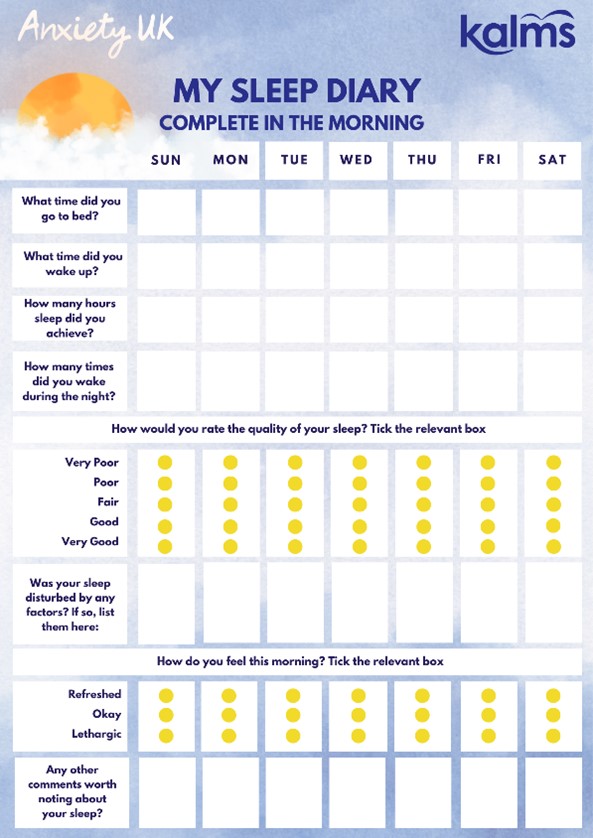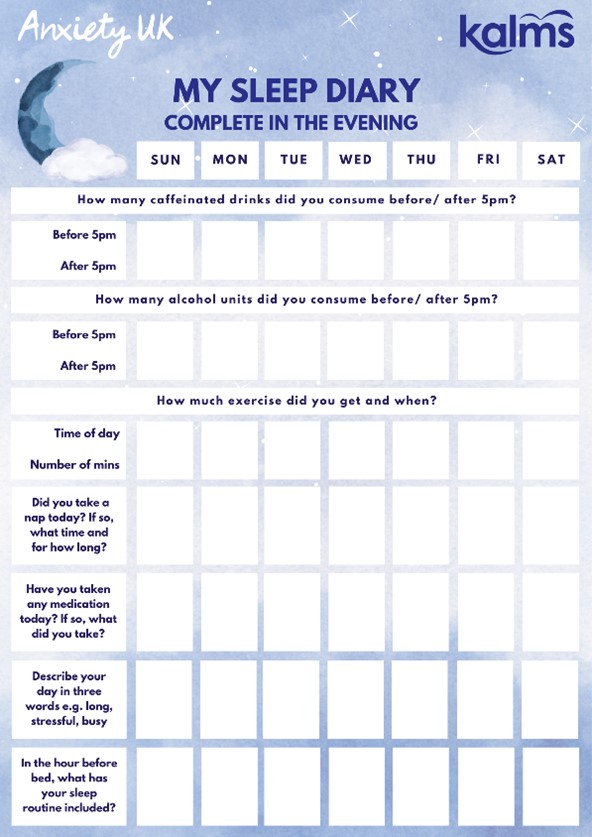Are UK adults locked into the stress-sleep cycle?
According to our recent study, over half of UK adults (54%) struggle to get the sleep they need, citing racing thoughts at night triggered by stress and anxiety as a cause for disruption.i
In today's fast-paced world, stress and anxiety have become an unavoidable part of daily life for many individuals. As a nation, we navigated the complex trials of a worldwide pandemic, only to be confronted with economic instability, geopolitical unrest and the perpetual challenges of 21st century living. It is hardly surprisingly then that so many of us have been struggling with our sleep.
Commenting on the study, Anxiety UK’s Director of Communications & External Affairs, Dave Smithson:
“Stress is our body’s reaction to pressures from a situation or life event and can be a common trigger for anxiety. In many everyday situations stress can be seen as a normal reaction that helps keep us alert, focused and motivatedii, but when stress becomes excessive or persists over a period of time, the opposite happens.
“This study highlights not only the impact that years’ of uncertainty has had on the nation’s sleeping habits, but also the bidirectional relationship between sleep and feelings of stress and anxiety.’
Stress can have a vast impact on our mental and physical well-being by impacting the balance of hormones and disrupting almost all of the body’, including sleep.iii
Dr Irshaad Ebrahim, co-founder of The London Sleep Centre and neuropsychiatrist, comments:
“When our internal neuro-chemical systems are working normally, they regulate biological processes like sleep, appetite, mood and energy levels. If we are stressed, the Adreno-Cortical System is dysregulated and our energy sources are diverted, resulting in sleep disruption and mood changes.
“Before we sleep it’s important to de-stress, reducing levels of cortisol, and replacing them with increased levels of melatonin, the hormone released in the brain that signals to the body it’s time to sleep.”
The persistence of stress can in turn worsen our ability to sleep. As we continue to accrue a sleep deficit - the cumulative effect of not getting enough sleepiv - our ability to concentrate worsens, mood drops and productivity decreases, all of which can emphasise feelings of stress and anxiety.v
Feeling stressed increases physiological and psychological arousal in ways that are incompatible with the conditions your body and mind need to enter a relaxed, restorative sleep.vi When this process repeats, a stress-sleep cycle is formed.
Dr Irshaad Ebrahim explains:
“Many peoples’ sleep issues are worsened through anticipatory stress, whereby we fear an outcome before the event has taken place. When this happens repeatedly, a cycle begins to form.
“The stress-sleep cycle is when feelings of stress stop you from achieving a sufficient night’s sleep, or when the thought of not achieving a good night’s sleep intensifies feelings of stress, thus exacerbating the cycle and making it harder to break.”
It's essential for individuals to recognise the importance of quality sleep for their overall health and well-being and to take proactive steps to prioritise and improve their sleep habits, even in the midst of challenging circumstances. This is where a sleep diary can help.
Completing a daily sleep diary can offer insights into both the quantity and quality of your sleep, enabling comparison against the recommended seven to nine hours. vii It can help you to identify which stressors, habits or routines are causing disruptions. For instance, you might find it harder to drift off when working late into the evening or wake more frequently in the night after a glass of wine.
From this information, you can make relevant changes to your daily routines, and incorporate new healthy habits to enhance your sleep such as switching off your electronic devices earlier in the evening or avoiding alcohol before bed.
If these changes don’t help, it may be worth showing your sleep diary to a healthcare professional. They may recommend other lifestyle changes, therapies, or medications that can reduce your stress levels and improve your quality of sleep.
To download a copy of our free sleep diary, developed with Anxiety UK, click here.
Simply fill in the sheet each morning and evening. To be effective, you need to complete your sleep diary honestly and fully. Keep the diary for at least 2 weeks and see if there are any patterns or practices that are helping or hindering your sleep.


*Please note, whilst Dave Smithson and Irshaad Ebrahim offer expert advice and commentary, they do not endorse the Kalms range.
[i] The Kalmfulness Index. A nationally representative study on 3,726 British respondents. Commissioned by Kalms. 2023.
[ii] Melinda Smith, M.A. (2024) Stress symptoms, signs, and causes, HelpGuide.org. Available at: https://www.helpguide.org/articles/stress/stress-symptoms-signs-and-causes.htm (Accessed: 15 March 2024).
[iii] Chronic stress puts your health at risk (2023) Mayo Clinic. Available at: https://www.mayoclinic.org/healthy-lifestyle/stress-management/in-depth/stress/art-20046037 (Accessed: 15 March 2024).
[iv] Sleep debt: What is it, consequences, and more (2023) WebMD. Available at: https://www.webmd.com/sleep-disorders/what-is-sleep-debt (Accessed: 15 March 2024).
[v] Gatt, A. (2023) Sleep study, Guides. Available at: https://www.chemist-4-u.com/guides/advice/insomnia/sleep-study/ (Accessed: 15 March 2024).
[vi] Relaxation exercises to help fall asleep (2024) Sleep Foundation. Available at: https://www.sleepfoundation.org/sleep-hygiene/relaxation-exercises-to-help-fall-asleep (Accessed: 15 March 2024).
[vii] Sleep diary: How and why you should keep One (2023) Sleep Foundation. Available at: https://www.sleepfoundation.org/sleep-diary (Accessed: 15 March 2024).
- 27th March 2024
